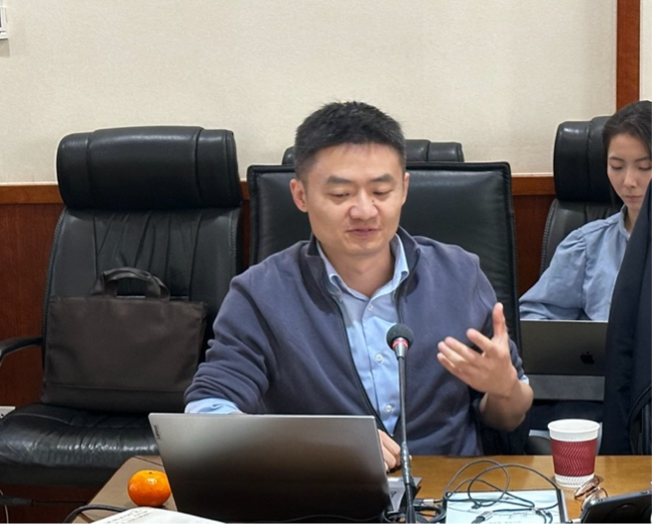
On April 12, the first lecture of the “Understanding the Global South” series, hosted by the Institute of Area Studies Peking University (PKUIAS), was held in Room C105 of the School of International Studies. Prof. Yin Zhiguang, from the School of International Relations and Public Affairs at Fudan University, was invited to deliver the keynote speech on the topic of “Global South and New Globalization.” The seminar was moderated by Zan Tao, deputy director of PKUIAS, and attended by many experts and scholars from PKU’s various departments and other universities.
At the beginning of the lecture, Prof. Yin Zhiguang pointed out the ambiguity of the concept of “global South” and China’s “theoretical poverty” on this topic. He argued that the inability to grasp a dynamic concept of great political significance such as the “global South” within an autonomous analytical framework could easily lead to a crisis of self-definition. For a long time, the global North’s definition of world order as being “the elimination of disorder” has been observed in a series of accusatory discourses by developed countries against China. Today’s US-centered narrative of international relations emphasizes the temporal rupture between the past and the present, arguing that all theoretical explorations are products of the modern era, but this obscures the fact that they are essentially derived from the medieval Christian theological tradition in the West. To emphasize its own particularity, the West has gradually developed the exclusionary idea of “no freedom except for me.” The American scholar G. John Ikenberry once put forward the concept of offensive liberalism, emphasizing the right of the US to help backward countries for humanitarian reasons, thus providing a logical justification for the U.S.’s global armed intervention. This logic is similar to the notion of “divine fiduciary duty” put forward by the 18th- and 19th-century British liberal tradition to justify colonial expansion, which was based on the imagery of the Christian theological model of eliminating sinful chaos in order to maintain the order created by God. However, China is a special case of a non-Western order system, and the question of where China should be placed becomes a great challenge to the established international system and the epistemology behind it. Therefore, recognizing the concept of the “global South” is not only a practical issue but also a theoretical one that points to the future.
Prof. Yin Zhiguang discussed possible paths for dismantling the Western epistemological trap and theorizing the global South from the perspective of the global South’s self-understanding. The global expansion of capitalism has woven the world into a monistic order, but this is not the only possibility for world order. On the one hand, the global South is aware that its internal diversity has not led to conflict in history and would not in the future; however, diversity leading to conflict thus causing disorder and panic is precisely the outcome of the order imagined by monistic philosophy. On the other hand, the global South is aware that its modernization is an experience of constant oppression through a series of lies, such as the global division of labor. The use of “community” as the basic unit of analysis is an important breakthrough. Community itself is not a simple material concept; the fundamental purpose of community building is the pursuit of the good. The measure of whether a country is reasonable or legitimate lies not in its distance from the liberal order but from whether it provides for a community of the good. The state in this sense is not a necessary evil but a limited good. This goodwill is not only limited to national boundaries but also includes interactive solidarity and autonomy.
Prof. Yin Zhiguang then talked about his views on modernization in the true sense of pluralism. Modernization itself has a North-South problematic difference. Modernization in the global South is not modernization in the broad sense. Not only does it face the practical problem of how to achieve high-quality development and reduce inequality at the same time under the structure of global imbalance, but it also has to think about the theoretical problem of whether to repeat the same old path of the Western countries and what kind of development model to choose. He pointed out that telling China’s story is a fundamental response to the monistic, old-fashioned, Christian worldview. In this sense, China’s participation in the development of the global South is expected to liberate the entire human race from the original monopolistic world system and order and open the switch for the world to move toward a better future.
In the discussion session, Prof. Zan Tao said that the dispute over the “concept of order” had a long history, emphasizing that the core issue of the current discourse on the “global South” was in fact the question of how to accommodate China. Prof. Zhang Yongle pointed out that the hegemonic system constantly adopted new discourses according to its interests, but the epistemological foundation and the monopoly of definitional power remained unchanged, and that the focus of the discussion on the global South is to break the monopoly and emphasize diversity. Teachers and students in the audience exchanged views with Prof. Yin Zhiguang on the phenomenon of anti-order in the global North and the institutional reform of cooperation among countries of the South.


